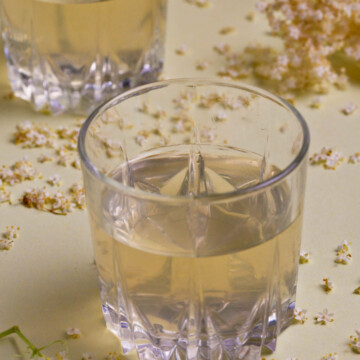
Elderflower Cordial (Zova, Bazga)
Zova or Bazga is an endlessly refreshing, springtime cordial made from elderflowers. (Also goes by sok od bazge, sok od zove.)
Equipment
- 4-5 34-ounce (1-liter) glass bottles with lids
Ingredients
- 30-40 elderflower heads (about 1lb/ 500g) must be without pesticides, grown away from a road or a street; one elderflower head is about the size of a palm
- 16 cups water
- 9 cups of sugar also, more sugar is fine for thicker syrup
- 3.5 tablespoons citric acid (sour salt), divided also goes by limuntos
- 1 lemon juice only
- (Optional) lemon slices, mint leaves for garnish when serving
Instructions
- Place elderflower heads into a large bowl and cover with 16 cups of water. (If you wish, you can cover the bowl with a kitchen towel or a tray to avoid anything falling in.) Leave at room temperature for 24 hours.
- The following day, add sugar and 1 tablespoon of citric acid to the flowers in water. Lightly stir. Leave for 24 hours, however, stir well a few more times during the day.
- On the third day, strain the juice through a colander into a different bowl. Once you've strained the liquid, also squeeze the elderflower heads well to get all the liquid out of them. (Optionally, strain one more time through a gauze to remove any leftover tiny flowers from the syrup. If they don't bother you, leave them.)
- Discard used elderflower heads, then add the remaining citric acid and lemon juice to the syrup. (You can taste the syrup to see if the acidity versus sugar combination is to your taste. Feel free to add more lemon juice or citric acid.) Stir really well, and let the juice sit for one hour.
- Heat oven to 220°F (100°C). Thoroughly wash glass bottles and their lids in soapy water. Rinse and pat dry. Place bottles (not the lids) on a thin pan, and then place the pan in the oven for about 15-25 minutes. This will sterilize them.
- Carefully take the pan with glass bottles out of the oven. Protecting your hands with oven mittens, pour the elderflower syrup into the bottles, and secure with lids. Leave in a cool, dark place for up to 6 months. Once you open the bottle, transfer it to the fridge and keep for 2-3 weeks.
- Once ready to serve, simply pour your desired amount of syrup (about ¼–½ cup, or per taste) into a glass, then top with still or sparkling water. Finish with a garnish of fresh lemon slices or mint leaves.
Notes
- Preparation Time
- Ingredients
- Ingredient Volume
- Nutritional Information
Tried this recipe?Let us know how it was!